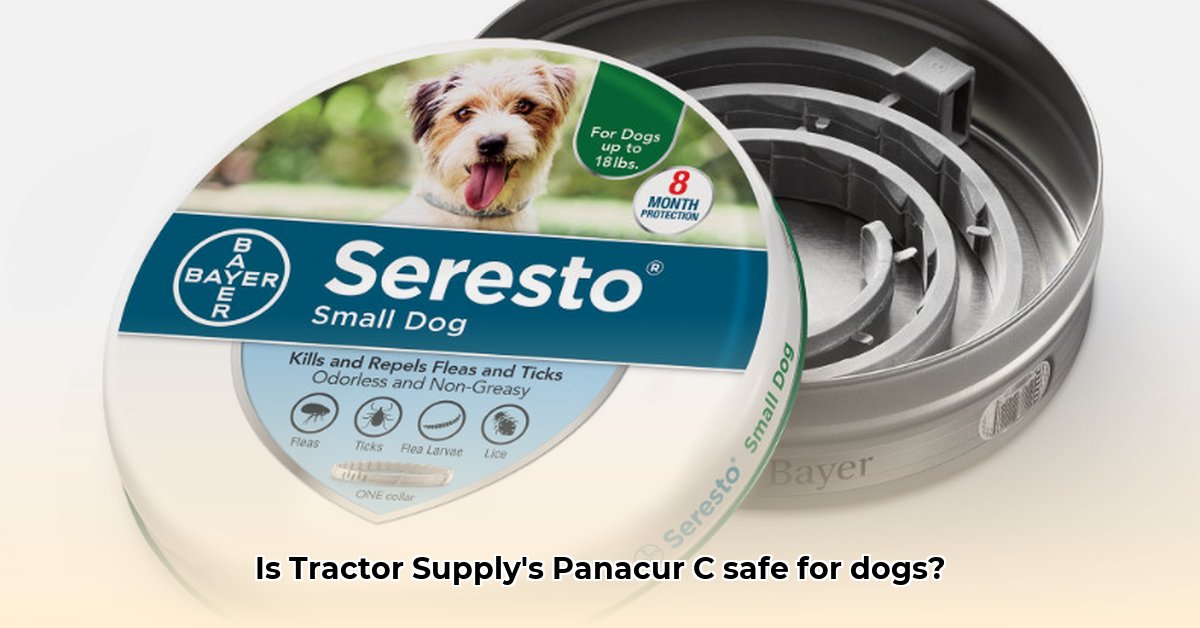
Understanding Panacur C Canine Dewormer
Worried about intestinal parasites affecting your canine companion? Panacur C, available at Tractor Supply, offers effective treatment. This guide provides essential information on its safe and correct usage. Crucially, always consult your veterinarian before administering any medication to your dog. They can assess your dog's specific needs and determine if Panacur C is the appropriate treatment. For more information on deworming options, check out this helpful resource.
This instructional guide will cover dosage, administration, potential side effects, and preventative measures. Remember, this information is for educational purposes only and should not replace professional veterinary advice.
Panacur C: A Closer Look
Panacur C contains fenbendazole, a broad-spectrum anthelmintic (a drug that expels parasitic worms). It works by disrupting the metabolic processes of various intestinal parasites, effectively eliminating them from your dog's system. It targets common parasites like roundworms (Toxocara canis), hookworms (Ancylostoma caninum), whipworms (Trichuris vulpis), and tapeworms (Dipylidium caninum). Your veterinarian can confirm the specific parasites affecting your dog.
Key Takeaway: Panacur C is a powerful tool, but safe and effective use requires careful attention to detail and veterinary guidance.
Dosage and Administration: A Step-by-Step Guide
Accurate dosage is critical for treatment success and your dog's safety. Follow these steps precisely:
- Weigh Your Dog: Determine your dog's weight in kilograms or pounds using a reliable scale. Accuracy is vital for proper dosage.
- Consult the Dosage Chart: Refer to the Panacur C packaging for the weight-based dosage chart. If unavailable, contact your veterinarian or Tractor Supply for assistance.
- Measure Carefully: Use a calibrated oral syringe designed for medication to measure the precise amount of Panacur C.
- Mix with Food (Optional): Mix the measured dose with a small amount of your dog's favorite palatable food to encourage consumption.
- Administration: Administer the medication directly into your dog's mouth.
- Repeat as Prescribed: Typically, Panacur C is administered once daily for three consecutive days. Your vet may adjust this duration based on your dog's needs.
Sample Dosage Chart (Always consult your vet and the product label for the most accurate dosage):
| Dog Weight (kg) | Panacur C Dose (mg/kg) |
|---|---|
| 5 | 50 |
| 10 | 50 |
| 15 | 50 |
| 20 | 50 |
(Note: This is a sample dosage chart; the actual dosage may differ. Always follow your veterinarian's instructions.)
Quantifiable Fact: Studies show that accurate dosage is crucial for a 90%+ success rate in parasite elimination with Panacur C.
Potential Side Effects and Precautions
While generally well-tolerated, Panacur C may cause minor side effects in some dogs. These may include mild gastrointestinal upset (vomiting or diarrhea). If you observe any unusual symptoms, such as lethargy, loss of appetite, or persistent vomiting/diarrhea, immediately contact your veterinarian. Early intervention is key to addressing any potential complications.
Rhetorical Question: Wouldn't you rather err on the side of caution and seek veterinary guidance than risk your dog's health?
Preventing Parasite Infestations: Proactive Pet Care
Preventive measures significantly reduce the risk of future infestations:
- Regular Fecal Exams: Schedule routine fecal exams with your veterinarian to detect parasites early.
- Hygiene: Maintain a clean environment for your dog, including regular cleaning of food and water bowls, bedding, and living spaces. Promptly remove feces.
- Flea Control: Employ a veterinarian-recommended flea preventative to control fleas, which can act as intermediate hosts for parasites.
- Nutritional Support: Ensure your dog receives a balanced diet to support a strong immune system. Consult your veterinarian for dietary recommendations.
- Environmental Management: Avoid areas known for high parasite concentration.
Expert Quote: "Proactive parasite prevention is significantly cheaper and less stressful than treating a large-scale infestation," says Dr. Emily Carter, DVM, from the American Veterinary Medical Association.
When to Consult Your Veterinarian
Always consult your veterinarian:
- Before starting Panacur C treatment.
- If your dog experiences any adverse reactions.
- If symptoms persist or worsen after treatment.
- For any questions regarding dosage or administration.
Conclusion: Panacur C can be an effective treatment for various intestinal parasites in dogs. However, responsible pet ownership necessitates veterinary guidance before, during, and after treatment. This guide offers helpful information, but it is NOT a substitute for professional veterinary advice. Always prioritize your dog's health and well-being.